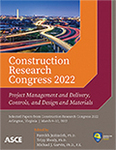Human Values and Sustainable Construction Management: A Literature Review
Publication: Construction Research Congress 2022
ABSTRACT
This review examines how human values have been conceptualized in sustainable construction and the primary considerations for the study, management, and application of values to the built environment’s transition to sustainability. “Values” are understood as “assets” and/or “goals” in the sustainable construction literature. These meanings are mediated by the triple bottom line model of economic, environmental, and social sustainability and by the ideals of benefit maximization, balance, and optimization. The review also revealed that sustainability has been defined as an adaptive system of values, and three approaches to it were synthesized: essentialism (alignment of stakeholders’ values with an absolute ethical framework), pragmatism (negotiation and use of already held values), and critical approach (empowerment of non-governing stakeholders). Findings support the idea that human values and the built environment are subject to an ongoing mutual reconfiguration. Findings also suggest how already-held values can be used to foster sustainability initiatives in the construction industry.
Get full access to this article
View all available purchase options and get full access to this chapter.
REFERENCES
Farmer, G., and Guy, S. (2010). Making morality: Sustainable architecture and the pragmatic imagination. Building Research and Information, 38(4), 368–378. https://doi.org/10.1080/09613218.2010.482236.
Fereday, J., Adelaide, N., Australia, S., and Eimear Muir-Cochrane, A. (2006). Demonstrating Rigor Using Thematic Analysis: A Hybrid Approach of Inductive and Deductive Coding and Theme Development.
Fink, H. S. (2011). Promoting behavioral change towards lower energy consumption in the building sector. In Innovation: The European Journal of Social Science Research (Vol. 24, Issues 1–2, pp. 7–26). Routledge. https://doi.org/10.1080/13511610.2011.586494.
Geldermans, R. J. (2016). Design for Change and Circularity - Accommodating Circular Material & Product Flows in Construction. Energy Procedia, 96, 301–311. https://doi.org/10.1016/j.egypro.2016.09.153.
GhaffarianHoseini, A., Ibrahim, R., Baharuddin, M. N., and GhaffarianHoseini, A. (2011). Creating green culturally responsive intelligent buildings: Socio-cultural and environmental influences. Intelligent Buildings International, 3(1), 5–23. https://doi.org/10.3763/inbi.2010.0002.
Horlings, L. G. (2015). The inner dimension of sustainability: Personal and cultural values. In Current Opinion in Environmental Sustainability (Vol. 14, pp. 163–169). Elsevier. https://doi.org/10.1016/j.cosust.2015.06.006.
Ismael, D., and Shealy, T. (2018). Aligning Rating Systems and User Preferences: An Initial Approach to More Sustainable Construction through a Behavioral Intervention. https://doi.org/10.1061/9780784481301.071.
Jones, N. A., Shaw, S., Ross, H., Witt, K., and Pinner, B. (2016). The study of human values in understanding and managing social-ecological systems. Ecology and Society, 21(1). https://doi.org/10.5751/ES-07977-210115.
Kissfazekas, K. (2015). Relationships between politics, cities and architecture based on the examples of two Hungarian New Towns. Cities, 48, 99–108. https://doi.org/10.1016/j.cities.2015.06.007.
Klotz, L., Weber, E., Johnson, E., Shealy, T., Hernandez, M., and Gordon, B. (2018). Beyond rationality in engineering design for sustainability. In Nature Sustainability (Vol. 1, Issue 5, pp. 225–233). Nature Publishing Group. https://doi.org/10.1038/s41893-018-0054-8.
Koski, C. (2010). Greening America’s Skylines: The Diffusion of Low-Salience Policiesp sj_346 93.118.
Levitt, R. E. (2007). CEM Research for the Next 50 Years: Maximizing Economic, Environmental, and Societal Value of the Built Environment 1. Journal of Construction Engineering and Management. https://doi.org/10.1061/ASCE0733-93642007133:9619.
Maio, G. R. (2016). The Psychology of Human Values. https://doi.org/https://doi.org/10.4324/9781315622545.
Mavi, R. K., Gengatharen, D., Mavi, N. K., Hughes, R., Campbell, A., and Yates, R. (2021). Sustainability in construction projects: A systematic literature review. In Sustainability (Switzerland) (Vol. 13, Issue 4, pp. 1–24). MDPI AG. https://doi.org/10.3390/su13041932.
Murtagh, N., Scott, L., and Fan, J. (2020). Sustainable and resilient construction: Current status and future challenges. In Journal of Cleaner Production (Vol. 268). Elsevier Ltd. https://doi.org/10.1016/j.jclepro.2020.122264.
Novak, V. M. (2012). Value paradigm: Revealing synergy between lean and sustainability. IGLC 2012 - 20th Conference of the International Group for Lean Construction.
Oishi, S. (2014). Socioecological psychology. In Annual Review of Psychology (Vol. 65, pp. 581–609). Annual Reviews Inc. https://doi.org/10.1146/annurev-psych-030413-152156.
Opoku, A. (2019). Biodiversity and the built environment: Implications for the Sustainable Development Goals (SDGs). Resources, Conservation and Recycling, 141, 1–7. https://doi.org/10.1016/j.resconrec.2018.10.011.
Peter, C., and Swilling, M. (2014). Linking complexity and sustainability theories: Implications for modeling sustainability transitions. Sustainability (Switzerland), 6(3), 1594–1622. https://doi.org/10.3390/su6031594.
Rifkin, W., Witt, K., Everingham, J., and Uhlmann, V. (2015). SPE-176941-MS Benefits and Burdens for Rural Towns from Queensland’s Onshore Gas Development.
Ross, H., Witt, K., and Jones, N. A. (2018). Stephen Kellert’s development and contribution of relational values in social-ecological systems. In Current Opinion in Environmental Sustainability (Vol. 35, pp. 46–53). Elsevier B.V. https://doi.org/10.1016/j.cosust.2018.10.007.
Schwake, G. (2020). The Americanisation of Israeli housing practices. Journal of Architecture, 25(3), 295–316. https://doi.org/10.1080/13602365.2020.1758952.
Solaimani, S., and Sedighi, M. (2020). Toward a holistic view on lean sustainable construction: A literature review. Journal of Cleaner Production, 248. https://doi.org/10.1016/j.jclepro.2019.119213.
Thomé, A. M. T., Ceryno, P. S., Scavarda, A., and Remmen, A. (2016). Sustainable infrastructure: A review and a research agenda. In Journal of Environmental Management (Vol. 184, pp. 143–156). Academic Press. https://doi.org/10.1016/j.jenvman.2016.09.080.
Witmer, A. P. (2018a). The influence of development objectives and local context upon international service engineering infrastructure design. International Journal of Technology Management and Sustainable Development, 17(2), 135–150. https://doi.org/10.1386/TMSD.17.2.135_1.
Witmer, A. P. (2018b). Contextual engineering assessment using an influence-identification tool. Journal of Engineering, Design and Technology, 16(6), 889–909. https://doi.org/10.1108/JEDT-05-2018-0091.
Wuyts, W., Miatto, A., Sedlitzky, R., and Tanikawa, H. (2019). Extending or ending the life of residential buildings in Japan: A social circular economy approach to the problem of short-lived constructions. Journal of Cleaner Production, 231, 660–670. https://doi.org/10.1016/j.jclepro.2019.05.258.
Zhang, L., and El-Gohary, N. M. (2015). Discovering Stakeholder Values for Axiology-Based Value Analysis of Building Projects. https://doi.org/10.1061/(ASCE)CO.1943-7862.
Information & Authors
Information
Published In
History
Published online: Mar 7, 2022
Authors
Metrics & Citations
Metrics
Citations
Download citation
If you have the appropriate software installed, you can download article citation data to the citation manager of your choice. Simply select your manager software from the list below and click Download.
